|

 here did all the rumors about literary agents come from? Was it written somewhere on a bathroom wall in a mythical place called Writer Town? Perhaps, it's a scary bedtime story passed down to the younger generation from disgruntled authors. here did all the rumors about literary agents come from? Was it written somewhere on a bathroom wall in a mythical place called Writer Town? Perhaps, it's a scary bedtime story passed down to the younger generation from disgruntled authors.
 As you may expect, many websites and writer's discussion boards have lengthy topics devoted to unearthing the dirt on agents, thus propelling the ongoing saga of the unscrupulous literary agent. There are books dedicated to landing agents, what you should or should not do, and horrific stories of big bad agents that will give you nightmares! As you may expect, many websites and writer's discussion boards have lengthy topics devoted to unearthing the dirt on agents, thus propelling the ongoing saga of the unscrupulous literary agent. There are books dedicated to landing agents, what you should or should not do, and horrific stories of big bad agents that will give you nightmares!
 All aspiring authors have heard that they need an agent, but when it comes down to it, many of them are scared to approach one. Then there are those writers that are overconfident and approach a literary agent like a sandwich. All aspiring authors have heard that they need an agent, but when it comes down to it, many of them are scared to approach one. Then there are those writers that are overconfident and approach a literary agent like a sandwich.
 Well, whatever category you may have fallen prey to, this interview will bust that myth. All you need to know is: writing is a profession, do your research, and agents are people too. Well, whatever category you may have fallen prey to, this interview will bust that myth. All you need to know is: writing is a profession, do your research, and agents are people too.
 Meet Jennifer DeChiara of The Jennifer DeChiara Literary Agency. She's an agent, a human being, and most of all, she's a wonderful person that anyone would be thrilled to meet-writer or otherwise. Meet Jennifer DeChiara of The Jennifer DeChiara Literary Agency. She's an agent, a human being, and most of all, she's a wonderful person that anyone would be thrilled to meet-writer or otherwise.
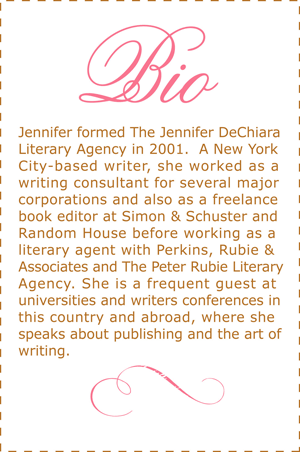 WOW: Jennifer, you have quite an extensive resume, from working as a literary agent for Perkins, Rubie & Associates to the editing department of Simon & Schuster and Random House. WOW: Jennifer, you have quite an extensive resume, from working as a literary agent for Perkins, Rubie & Associates to the editing department of Simon & Schuster and Random House.
 Considering your success, why did you decide to open The Jennifer DeChiara Literary Agency? Considering your success, why did you decide to open The Jennifer DeChiara Literary Agency?
Jennifer: I started my agency because I wanted to help put great books in the world, and I wanted to help writers, both established authors and aspiring writers.
 Books are my passion, and I'm convinced that they change the world, in big and small ways. To know that I've helped create a book that will possibly put a smile on someone's face or maybe change his or her thinking about something is incredibly fulfilling for me. Books are my passion, and I'm convinced that they change the world, in big and small ways. To know that I've helped create a book that will possibly put a smile on someone's face or maybe change his or her thinking about something is incredibly fulfilling for me.
 I've also been a writer my entire life, so I know firsthand what writers go through. I understand the frustration, the rejection, and, most of all, the hard work. After you pay your dues to fine-tune your art, you find that most doors are closed to you. It's incredibly difficult to find an agent and/or a publisher. A lot of writers are rejected because they're too young or too old or have a bad sales record, even though they might be wonderful writers. As an underdog from way back - in fact, I was Underdog before Underdog got his television series - I know what it's like on the other side of the fence. I'm trying to even out the playing field, I guess! I've also been a writer my entire life, so I know firsthand what writers go through. I understand the frustration, the rejection, and, most of all, the hard work. After you pay your dues to fine-tune your art, you find that most doors are closed to you. It's incredibly difficult to find an agent and/or a publisher. A lot of writers are rejected because they're too young or too old or have a bad sales record, even though they might be wonderful writers. As an underdog from way back - in fact, I was Underdog before Underdog got his television series - I know what it's like on the other side of the fence. I'm trying to even out the playing field, I guess!
 I love being an agent; the best part of it for me is making dreams come true. Basically, I started my agency for the downtrodden, the discouraged, and the downright disgusted. I love being an agent; the best part of it for me is making dreams come true. Basically, I started my agency for the downtrodden, the discouraged, and the downright disgusted.

WOW: (laughs) I was a big fan of Underdog! And your inspiration for starting your agency is beautiful...
 For an author who is just starting out, it's hard to understand just what an agent does before they actually need to have one. So, can you tell us a bit about what an agent does for her client? For an author who is just starting out, it's hard to understand just what an agent does before they actually need to have one. So, can you tell us a bit about what an agent does for her client?
Jennifer: An agent is, or should be, a writer's best friend. Agents help their clients polish their work, pitch and submit their material to the appropriate editors and houses, negotiate their book deals, help with promotion, and, basically, take care of everything career-related so that the author can concentrate on his writing. A big part of being an agent - maybe the most important part, in my opinion - is being the writer's support, someone they can turn to for encouragement and advice. I am convinced that it frees the writer to develop his best writing when he feels that someone whose opinion he values is in his corner and believes in him.
WOW: I think that's very true. I've especially found that many first-time authors feel excited, even ecstatic, once a literary agent has accepted to represent them. They feel that their hardship is over and that they can settle back, reaping the benefits that the agent will bring to the table. Yet, once the euphoria of the initial signing with an agent fades and the communications become less frequent, whether there is a book deal or not, many authors grow insecure about their agent-client relationships.
 Do you think that unrealistic expectations and/or misconceptions about the agent-client relationship play a part in the malaise of authors? Do you think that unrealistic expectations and/or misconceptions about the agent-client relationship play a part in the malaise of authors?
Jennifer: I think that most authors have unrealistic expectations about the agent-client relationship. I advise writers to discuss these at the beginning of the relationship so that they know what to expect. Most writers will expect their agent to stay in constant, perhaps daily or weekly, touch with them and update them on the status of their manuscripts. In a perfect world, that would be great; I'd love to have the time to chat with my authors. Unfortunately, agents are incredibly busy people, and they don't have time to update their clients unless there's something to report. I usually tell my clients to check in with me about every six weeks or so; if they call me more often than that, I won't have anything to report and they'll be wasting my time and theirs.
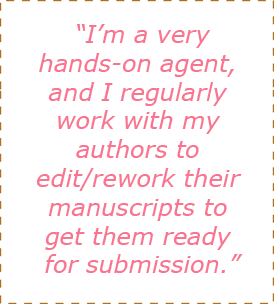 WOW: That makes perfect sense. So, how can authors be proactive in maintaining a positive ongoing agent-client relationship? WOW: That makes perfect sense. So, how can authors be proactive in maintaining a positive ongoing agent-client relationship?
Jennifer: To maintain a positive relationship, clients should make sure they understand how their particular agent works - do they prefer being emailed or phoned for updates? How often? Then they should stick to those ground rules.
 It's always wonderful when a client will take some initiative and learn as much as possible about the publishing world; sometimes they'll go to conferences and take seminars on book publicity, sometimes they'll join a writer's group to hone their writing. They try to work with me as part of a team, and it helps me help them. It's always wonderful when a client will take some initiative and learn as much as possible about the publishing world; sometimes they'll go to conferences and take seminars on book publicity, sometimes they'll join a writer's group to hone their writing. They try to work with me as part of a team, and it helps me help them.
WOW: How could a novice writer find out which agent would be a good fit for her work?
Jennifer: If a novice writer needs to find an agent who would be a good fit for her work, there are several things she can do. First, she should go to the bookstore and look through the literary agents guides, which have lists of agents and the kinds of books they represent. They can also check the books on the bookshelves that are in their genre; authors usually thank their agents in the acknowledgments. The internet is also a great resource; Publisher's Marketplace is a terrific web site that lists book deals, and there are many great online writers magazines and chat rooms. Writers should also read Publisher's Weekly regularly for all kinds of great publishing information and inspiration.
WOW: With all the competing authors, what convinces you to take on a client?
Jennifer: What convinces me to take on a client is, first, writing talent. What's most important to me is a writer's voice. I can always help a writer rework a plot or flesh out a character, but I can't give someone that certain indefinable something. I want a writer who has something to say and a special way of saying it. It's hard to describe, but when I find it - it hits me in the gut. In addition to having talent, though, a writer must also be easy to work with, be able to take constructive criticism, be able to revise accordingly and work with their editor on deadline, and be willing, able, and eager to promote their own work. Sometimes the latter qualities are impossible to know at the beginning of the relationship, but once they become apparent, they either enhance the agent-client relationship or destroy it.
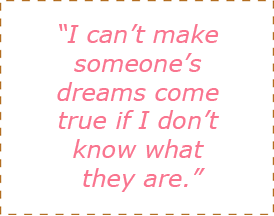 WOW: Do you ever work with your represented authors to edit/rework their novel to get it ready for submission to editors? WOW: Do you ever work with your represented authors to edit/rework their novel to get it ready for submission to editors?
Jennifer: I'm a very hands-on agent, and I regularly work with my authors to edit/rework their manuscripts to get them ready for submission. Sometimes a book will need a total restructuring, and sometimes it will need only minor line editing or proofreading. I love all of it!
WOW: That's refreshing to hear, because most first-time authors seem to think that agents really don't do very much editing anymore. So , after you acquire an author, what happens next?
Jennifer: After I acquire an author, I like to have a discussion with them about their career goals. I always tell them to share their writing dreams, no matter how unrealistic they might seem. I can't make someone's dreams come true if I don't know what they are. Then I tell them my plans and strategies for their career, which change as we go along. After this major discussion, we start working on their manuscript or proposal and try to make it the best it can be so I can start shopping it around.
WOW: When you shop it around, do you pitch to multiple editors? How many do you pitch to, and does this result in a better contract?
Jennifer: Each book is submitted differently, but I often submit to multiple editors. When I do, there's no hard and fast rule about how many I submit to; it really all depends on that particular book and what my plans are for it. Sometimes multiple submissions can result in an auction, with several publishers fighting for a book. Pitching to multiple publishers doesn't necessarily result in a better contract for the author unless you have an auction situation; then an agent has more leverage and can usually get a better deal for her client.
WOW: After you sell that first book, is there a typical turnaround time that it takes the authors you represent to come out with their second one?
Jennifer: Most of my authors are pretty prolific and come out with their second novels right away; a few of them will need more time. I wouldn't say that there's a typical turnaround time, but I think that most editors and agents expect their authors to have ideas and be able to develop those ideas into saleable books and not take forever to do it. I think it's all part of being a professional writer.
WOW: Another part of being a professional writer is promotion. What responsibility do you expect an author to fulfill regarding the promotion of her book?
Jennifer: I expect an author to take full responsibility regarding the promotion of her book. Unfortunately, publishers don't have the money or the manpower to promote more than their very top authors. All of the other authors have to make do with very little in terms of marketing, promotion, and publicity. The author who does everything she can to self-promote her book will often be the determining factor in whether or not her book sells well; in addition, if an author works hard to publicize her book, the publisher often is inspired to help.
WOW: We've heard from several authors that having an online presence is almost a mandatory 'suggestion' from their agents and publishers. How important do you think online networking is, and what part does it play in the publishing industry?
Jennifer: These days, having an online presence is extremely important. It's a valuable method of book promotion, especially for young adult authors. An author should start with a great web site, but there are many ways that they can and should exploit the cyber world to promote their books. There are tons of books to help authors with this, and they should try to do this ideally before the book even comes out.
WOW: Do you attend many writer conferences?
Jennifer: Yes, I attend writer's conferences, and I've found many clients that way. In my opinion, they're an excellent way for writers to meet agents and editors and learn about the publishing world. They're also fun!
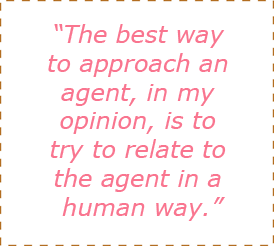 WOW: It's great to hear you say they're fun, because we hear so many horror stories from agents, saying that authors approached them in the bathroom at conferences etc. Is there a "polite way" to be noticed by an agent at a conference, or is it better etiquette to leave the initial contact to paper? WOW: It's great to hear you say they're fun, because we hear so many horror stories from agents, saying that authors approached them in the bathroom at conferences etc. Is there a "polite way" to be noticed by an agent at a conference, or is it better etiquette to leave the initial contact to paper?
Jennifer: If I go to a writer's conference, I assume that writers will be there and will try to get my attention. I look forward to meeting writers and talking with them about their various projects, always. But sometimes they will go to extremes - yes, I've been approached outside my bathroom stall, been stalked in hotels, and had wannabe clients come up with incredible ruses to get into my room and leave a manuscript. The best way to approach an agent, in my opinion, is to try to relate to the agent in a human way - make eye contact, smile, and maybe say something about the conference, the weather, how tired the agent must be after listening to pitches all day. Say something, anything, that shows the agent that you see her as a person. Try to have a real conversation. Let the agent ask YOU about your book. It's rare that this happens, but when it does, I'm so grateful that the person is considerate of my situation that I will ask them to tell me about their project.
WOW: Regarding projects, what subjects does The Jennifer DeChiara Literary Agency represent?
Jennifer: The agency represents children's literature in a variety of age ranges and genres, everything from picture books to middle-grade books to young adult books; we also represent adult fiction and nonfiction in almost every genre - literary fiction, commercial fiction, women's fiction, celebrity biographies, film and television, self-help, health, social issues and contemporary affairs, mysteries, thrillers - and much more. We also represent screenplays, TV projects, and stage plays. The agency has a foreign sales director, and we have foreign agents in every country of the world. We also have film agents in Hollywood and New York City to handle our film projects.
WOW: Are there any genres that you'd say are overly saturated at the moment?
Jennifer: What happens often is that I'll get a lot of submissions in a particular genre at the same time. For a while I was getting a lot of celebrity picture books, then a lot of memoirs, and so forth. It usually coincides with what's happening on television at the moment. I know that the fantasy market is saturated, for example, with everyone wanting to copy Harry Potter's success. At the same time, however, I hesitate to be discouraging to authors in this regard. If there is a story or genre that you're passionate about, stick with it. I'm convinced that despite the market, there's always room for a great story and a great voice.
WOW: You represent quite a few Children's Literature-picture books, middle-grade, and young adult. What draws you to this subject?
Jennifer: I love representing children's books because I love the idea of doing something that will possibly create a child's lifelong relationship with books. I can still remember the books I loved as a child, and there are books that I know influenced me to become the person I am now. It's thrilling to be a part of that. Children's books are challenging because you not only have to appeal to a child, but also to the parent buying the book. But they're also a lot of fun to work on. Most important for me is knowing that one of the books I've helped create and/or sell might put a smile on a child's face. I don't think there's anything nobler than that.
WOW: You also have strong connections with Hollywood! I'm sure our readers would love to know how the two worlds collide or coincide, and just how does that happen?
Jennifer: When I represent a book, I try to exploit it in every possible way - film, television, stage, and so forth. The agency has strong Hollywood connections, and I honestly don't know how a literary agency can function without them. We regularly work on film projects, and the two worlds are definitely connected - for us anyway.
WOW: Jennifer, we all have a story that influenced or inspired us to get into the field of writing. can you share your story with us?
Jennifer: I don't really have a story to tell. All I know is that I've wanted to write since I was two. Seriously, I remember taking a crayon and a piece of blank paper to the toilet, putting the lid down, and using it as my desk. (It was the perfect height!) I remember standing there and drawing circles with my crayon. When my dad came in and asked me what I was doing, I said, "I'm writing a book." So, you see, it was always a passion! Only now I have a much nicer desk!
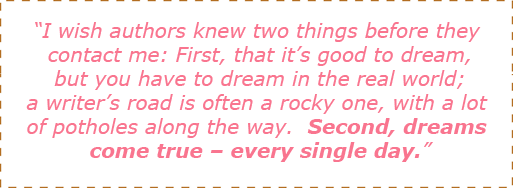
WOW: What advice do you have for aspiring authors?
Jennifer: My advice for aspiring authors is to learn as much as possible about their art - take writing classes, join writer's groups, and, most important, read - especially books in their genre. Then try to learn as much about the business of writing and getting published as possible - go to writer's conferences, read magazines, and books on the topic, and exhaust every possible resource. Submit your work as much as you possibly can, and try to gather information from any rejections you receive. Then try to be objective about the feedback and see if you can possibly improve on your work. But the most important advice I can give you is to believe in yourself and never give up.
WOW: What do you often wish authors knew before contacting you?
Jennifer: Authors fall into two categories: those who have unrealistic expectations and think that their careers are going to happen overnight and those who are cynical and think that their success will NEVER happen. I wish authors knew two things before they contact me: First, that it's good to dream, but you have to dream in the real world; a writer's road is often a rocky one, with a lot of potholes along the way. Second, dreams come true - every single day. DREAMS COME TRUE.
WOW: Okay, fun question, interpret at will. Since this issue is called, "Walking in an Agent's Shoes," I have to ask: What is your favorite pair of shoes? And what is it like to walk in them?
Jennifer: My favorite pair of shoes are my very first pair of ballet shoes; they still fit me because I didn't start dancing until I was sixteen. I had wanted to study ballet since I was a baby, but my parents couldn't afford to give me lessons. I was determined to be a ballerina, and each week I would save my babysitting money for classes at the community ballet school. Although everyone around me told me I was too old to start lessons and that I should abandon all hopes of ever becoming a dancer, I proved them wrong. Right after college, I danced professionally with several ballet companies and even worked as a principal dancer for some opera companies. It was one of the hardest things I've ever done, but it was also one of the best things I've ever done. Every once in a while when life gets overwhelming and I start feeling that things are impossible, I slip those shoes on and walk around in them. Sometimes I swear I can even hear applause.
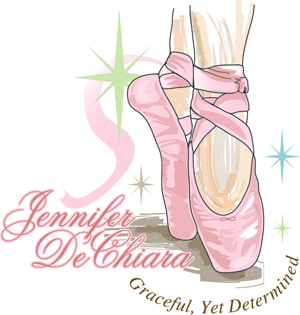 WOW: Jennifer, we can all hear the applause too... and it roars! WOW: Jennifer, we can all hear the applause too... and it roars!
Contact Jennifer:
Jennifer DeChiara
The Jennifer DeChiara Literary Agency
254 Park Avenue South
Suite 2L
New York, N.Y. 10010
jenndec@aol.com
www.jdlit.com
Special Note: WOW! sincerely thanks Jennifer, not only for this fabulous informative interview, but also for sharing her heart with us. She is truly a one-of-a-kind gem, and will be in our hearts forever. This is the kind of connection one never forgets. |